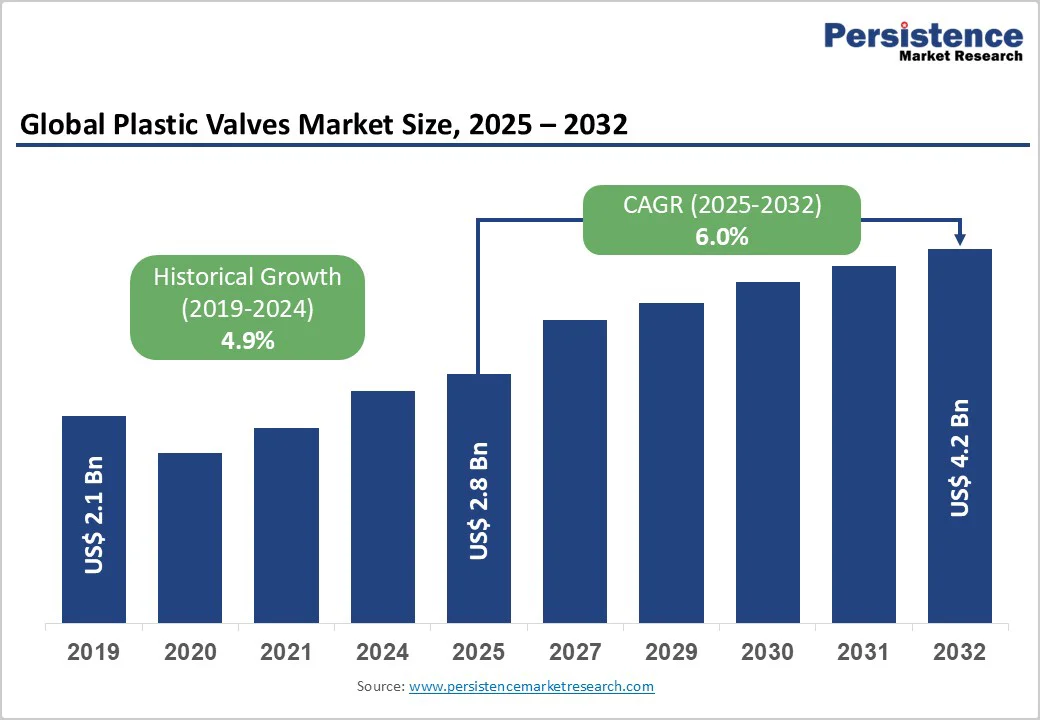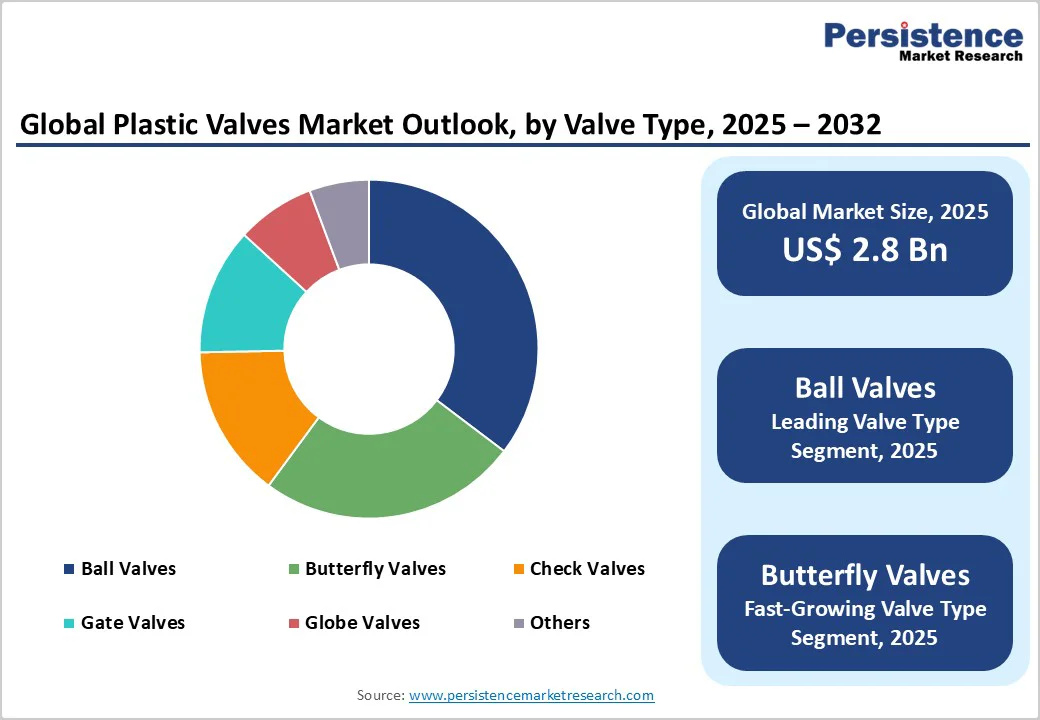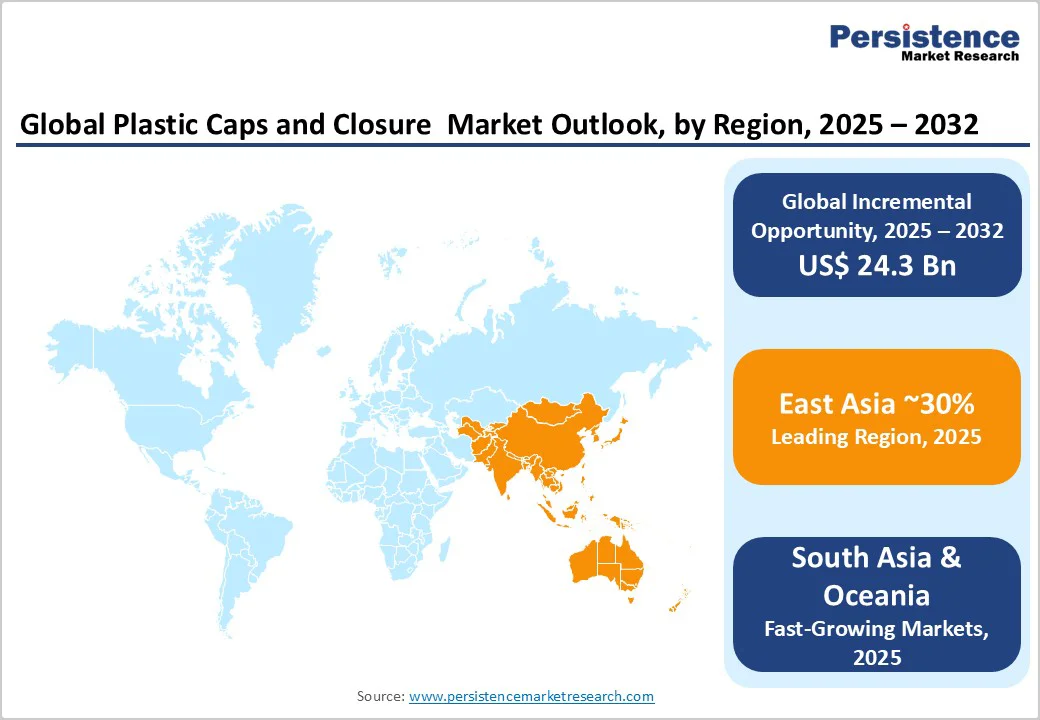ID: PMRREP33140| 188 Pages | 19 Nov 2025 | Format: PDF, Excel, PPT* | Industrial Automation

The global plastic valves market size is likely to value at US$2.8 billion in 2025 and is projected to reach US$4.2 billion by 2032, growing at a CAGR of 6.0% between 2025 and 2032.
This robust expansion is driven by increasing demand for corrosion-resistant flow control solutions across water treatment, chemical processing, and infrastructure development sectors. The market benefits from the inherent advantages of plastic valves including lightweight construction, superior chemical resistance, cost-effectiveness compared to metal alternatives, and reduced maintenance requirements.
| Key Insights | Details |
|---|---|
| Plastic Valves Market Size (2025E) | US$ 2.8 billion |
| Market Value Forecast (2032F) | US$ 4.2 billion |
| Projected Growth CAGR (2025 - 2032) | 6.0% |
| Historical Market Growth (2019 - 2024) | 4.9% |

The global water and wastewater treatment sector represents the most significant growth driver for plastic valves, with unprecedented infrastructure investments across both developed and emerging economies.
In the United States, the Infrastructure Investment and Jobs Act allocated ~$55 billion specifically for water and wastewater infrastructure, including $1.4 billion for stormwater systems. The U.S. loses approximately 2.1 trillion gallons of water annually from aging infrastructure breakdowns, with 79% of private sector companies identifying aging infrastructure as the water industry's biggest challenge.
India's water and wastewater market is projected to grow at 11.6% CAGR, with the Union Budget 2025-26 allocating around INR 74,226 crore to the Department of Drinking Water and Sanitation, including INR 67,000 crore for the Jal Jeevan Mission.
Plastic valves are essential components in these treatment facilities due to their resistance to chlorine, sodium hypochlorite, acids, and alkalis commonly used in water purification processes. The development of over 500 new treatment plants in India alone, adding 20 billion litres of capacity by 2027, creates substantial demand for corrosion-resistant plastic valve solutions.
The agricultural sector's transition toward smart irrigation systems and precision farming is driving significant demand for plastic valves. The global irrigation valves market, growing at a 4.9% CAGR, with agriculture accounting for around 55 to 60% of applications. Smart valves embedded with sensors and automation capabilities are expected to manage over 50% of irrigated farmland globally by 2025, reducing water waste and labor costs.
The irrigation machinery market is driven by sustainability requirements, precision engineering, and renewable energy integration such as solar-powered pumps. Ball valves dominate the irrigation segment with ~34.8% market share in 2024 due to their simple operation, quick shut-off capabilities, and minimal pressure drop.
Water scarcity challenges and climate change impacts necessitate efficient water management solutions, with plastic valves offering durability, weather resistance, and cost-effectiveness essential for large-scale agricultural operations.
The plastic valve market faces growth constraints due to the inherent temperature and pressure limitations of thermoplastic materials compared with metal alternatives. Standard PVC valves generally operate below 150 PSI and 140°F (60°C), while CPVC types extend usability to around 200°F (93°C).
These performance limits restrict adoption in high-pressure reverse osmosis systems, industrial heating, steam sterilization, and oil and gas refining, where conditions exceed plastic capabilities.
Consequently, metal valves remain indispensable in heavy-duty environments requiring higher thermal and mechanical endurance. Additionally, long-standing perceptions of reduced strength and durability among end users accustomed to metal valves create psychological resistance, particularly in conservative industrial sectors.
This combination of material and perceptual limitations continues to challenge broader plastic valve penetration in high-pressure or high-temperature applications demanding proven reliability and compliance with stringent industry safety standards.
Fluctuating raw material prices, particularly petroleum-based plastics, pose a significant challenge for the plastic valves market by increasing production costs and reducing pricing flexibility. Volatility in crude oil prices directly impacts the cost of PVC, CPVC, polypropylene, and PVDF resins, influencing overall profitability. Supply chain disruptions during global crises further strain the availability and pricing of essential engineering plastics, complicating market stability.
Additionally, specialty-engineered valves made from advanced materials like PVDF or PTFE entail higher initial costs, limiting adoption in price-sensitive regions. Small-scale farmers and industries often find automated or smart valve systems expensive to implement despite long-term savings in water and labor efficiency.
These cost barriers hinder market penetration across developing economies, requiring manufacturers to balance material performance, affordability, and accessibility to sustain competitiveness while meeting infrastructure modernization and sustainability demands globally.
The integration of Internet of Things (IoT) technologies and automation systems with plastic valves represents a transformative market opportunity. The electric valve actuators market is projected to grow at a 6.5% CAGR, reflecting increasing demand for automated flow control solutions.
Smart actuators with IoT capabilities enable real-time data collection, remote monitoring, and improved operational efficiency, addressing growing industry emphasis on safety, reliability, and operational optimization.
The rise of Industry 4.0 and process automation is driving adoption of electric actuators that can increase energy efficiency by up to 30% in various industrial applications according to the U.S. Department of Energy. Plastic valves integrated with pneumatic and electric actuation systems offer enhanced control, predictive maintenance capabilities, and seamless integration with building information management systems.
The deployment of IoT-enabled valves in the chemical industry rose by 8% in 2024, supporting market revenue growth through enhanced product differentiation and customer retention. Market opportunities extend beyond industrial applications into agricultural smart irrigation systems, where sensor-integrated valves provide soil moisture data, weather monitoring, and pressure control for precision water management.
Rapid industrialization and urbanization in emerging economies present substantial growth opportunities for plastic valve manufacturers. India's industrial valves market was growing at a 7.74% CAGR, driven by manufacturing sector expansion, smart city initiatives, and infrastructure investments.
India's urban population is expected to reach 600 million by 2036, requiring an estimated $840 billion investment in urban infrastructure over the next 15 years, with current government financing covering about 72% through central and state programs.
The Smart Cities Mission involves over 8,000 projects with operational Integrated Command and Control Centers across 100 designated cities, creating demand for advanced valve technologies in urban utilities management.
China's continued infrastructure development and industrial expansion maintain strong demand for cost-effective plastic valve solutions across water distribution, chemical processing, and manufacturing sectors. Asia Pacific accounts for a 40% share and is the fastest-growing region with a 6.8% CAGR, driven by manufacturing advantages, expanding construction activities, and government investments in water and sanitation infrastructure.
Polyvinyl Chloride (PVC) dominates the material segment with a commanding 42% market share, establishing itself as the most widely adopted plastic valve material globally.
PVC's market leadership stems from its exceptional cost-effectiveness, excellent corrosion resistance, and proven performance across diverse applications including cold water supply, irrigation, pool systems, and general chemical handling. The material exhibits outstanding resistance to most acids and alkalis, does not rust, pit, scale, or corrode, and offers superior chemical inertness preventing reactions with transported substances.
PVC valves are certified by NSF International for potable water use and maintain pressure ratings of 150 PSI at 73°F, making them suitable for municipal water distribution, wastewater treatment, and light industrial applications.
The material's affordability, with costs typically 40-60% less than metal alternatives, combined with reduced installation labor requirements due to lightweight construction, drives widespread adoption in budget-conscious municipal and agricultural projects.
Polypropylene (PP) emerges as the fastest-growing material segment with a robust 6.7% CAGR, driven by superior chemical resistance properties in aggressive environments. Polypropylene is highly resistant to a wide pH range, making it suitable for acids, bases, salts, and organic solvents that could damage other materials.
It resists stress cracking and maintains structural integrity under chemical exposure, functioning in temperatures from -10°C to 100°C (up to 140°C for specialized grades). PP valves are essential in chemical processing, including acid handling, electroplating, water treatment, and pharmaceutical manufacturing.
Its FDA compliance enables use in food and beverage applications, while resistance to bacterial growth is beneficial for pharmaceuticals and high-purity water systems. The demand for PP is growing in industrial sectors requiring chemical stability, particularly in electroplating and corrosive fluid systems.
Ball Valves represent the dominant valve type segment, capturing 35% market share due to their versatility and reliable performance characteristics. Ball valves feature simple operation with quarter-turn on/off functionality, minimal pressure drop due to full-bore design, and bubble-tight sealing provided by PTFE seats and elastomer O-rings.
Butterfly Valves emerge as the fastest-growing valve type with an impressive 6.6% CAGR, driven by space efficiency and expanding large-diameter applications. Butterfly valves feature a compact wafer design with low flow restriction and lightweight construction for easy installation and quarter-turn operation, making them ideal for high-capacity flow control.
Their corrosion-resistant plastic ensures reliability in harsh conditions, reducing maintenance costs and production downtime.
Notably, GF Piping Systems' Butterfly Valve 565 is the first industrial butterfly valve with an Environmental Product Declaration (EPD), being 60% lighter than metal options and requiring no piping modifications. This valve also demonstrates a lower climate impact, highlighting plastic butterfly valves as sustainable choices for water and wastewater treatment.
Demand is growing in municipal water infrastructure, chemical processing, and industrial applications for large-diameter piping systems from DN50 to DN300.
Manual Valves maintain market leadership with a substantial 54% market share, reflecting continued demand for cost-effective, reliable flow control solutions. Manual valves dominate due to lower initial costs compared to automated alternatives, simplicity of operation requiring no power supply or control systems, and proven reliability in applications where frequent adjustments are unnecessary.
The segment excels in residential plumbing, agricultural irrigation, and small-scale industrial applications where automation isn't feasible. Manual ball valves offer ergonomic handles, safety-shear stems to prevent leaks, and a full Schedule 80 bore for optimal flow with minimal pressure drop.
Their market presence is bolstered by use in pool/spa systems, garden irrigation, light-duty water distribution, and general-purpose industrial applications that prioritize ease of use and low maintenance.
Electric Valves represent the fastest-growing actuation segment with a dynamic 6.9% CAGR, propelled by industrial automation trends and smart system integration. Electric actuation offers programmable control, integration with building management systems, remote monitoring, and eliminates the need for compressed air.
Smart technologies like IoT monitoring and Modbus protocols support predictive maintenance and real-time performance tracking, aligning with Industry 4.0. Key growth drivers include rising industrial automation in sectors such as water treatment, chemical processing, and pharmaceuticals, where accurate flow control is vital.
Government initiatives and the shift towards energy-efficient solutions, potentially improving efficiency by up to 30% per the U.S. Department of Energy, further boost the adoption of electric actuators.
Industrial applications dominate the end-use segment with a commanding 32% share, reflecting plastic valves' essential role in manufacturing and processing operations. The industrial segment encompasses chemical processing plants, pharmaceutical manufacturing, food and beverage production, pulp and paper facilities, and general manufacturing operations requiring corrosion-resistant flow control.
Chemical processing is a key area for plastic valves, which can handle aggressive substances such as strong acids and solvents that would quickly corrode metal valves.
Agricultural applications emerge as the fastest-growing end-use segment with a robust 6.7% CAGR, driven by irrigation system modernization and precision farming adoption. Agriculture plays a significant role in the irrigation valves market, crucial for food production and water management.
Growth is driven by the adoption of smart irrigation systems with automated valves and sensor integration for precise water delivery based on conditions. Water scarcity in agricultural regions calls for efficient irrigation infrastructure, with plastic valves providing durability and cost-effectiveness for large-scale farming.
Government initiatives promoting sustainable agriculture and water conservation support the expansion of modern irrigation systems using reliable plastic valve technologies.

North America demonstrates strong market momentum with a prominent 5.7% CAGR, positioning it as a key growth region for plastic valves. The United States dominates the regional market, driven by substantial infrastructure investments addressing aging water systems and expanding industrial operations.
The Infrastructure Investment and Jobs Act provides ~$55 billion for water and wastewater infrastructure, with an additional $1.4 billion for stormwater systems, creating immediate demand for corrosion-resistant valve solutions. The U.S. water infrastructure market requires addressing an estimated $81 billion gap for wastewater and $434 billion for stormwater over the next decade, with plastic valves positioned as cost-effective, durable solutions for system upgrades.
Migration to Southern states experiencing less rainfall and limited local water resources intensifies pressure on water infrastructure, necessitating efficient distribution systems incorporating reliable valve technologies.
Europe maintains a significant 25% market share in the global plastic valves market, reflecting the region's mature industrial base and stringent quality standards. Key markets include Germany, the United Kingdom, France, and Spain, with strong demand stemming from chemical processing industries, water treatment infrastructure, and manufacturing sectors.
Germany's industrial strength, particularly in chemical production and automotive manufacturing, drives specialized valve requirements for corrosive fluid handling and high-purity applications. The United Kingdom's focus on water infrastructure modernization and WRAS (Water Regulations Advisory Scheme) certification requirements ensures quality standards for drinking water contact materials.
Asia Pacific dominates the global plastic valves market with the largest 40% market share while simultaneously achieving the fastest regional growth positioning it as the market's primary growth engine.
China leads regional demand through massive infrastructure investments, industrial expansion, and manufacturing sector dominance spanning chemical processing, water treatment, electronics, and general industrial applications. India emerges as a critical growth market with industrial valves market projected to expand at 7.74% CAGR, driven by rapid industrialization, urbanization, and government infrastructure initiatives.

The global plastic valves market is moderately concentrated, with leading players such as GF Piping Systems, Asahi/America, NIBCO, and Flowserve dominating through innovation, quality assurance, and global distribution strength. Mid-tier firms like Plast-O-Matic, IPEX, and Cepex leverage specialization, flexibility, and regional expertise.
Competition centers on quality, customization, and certification compliance, while regional manufacturers excel through affordability, faster delivery, and tailored solutions for diverse industrial and infrastructural applications.
The global Plastic Valves Market was valued at US$2.8 billion in 2025 and is projected to reach US$4.2 billion by 2032, demonstrating substantial market scale with 50% growth potential over the seven-year forecast period.
The market is mainly driven by the expansion of water and wastewater treatment infrastructure, growth in the chemical processing industry, and modernization of agricultural irrigation. By 2025, smart valves will manage over 50% of irrigated farmland.
The Plastic Valves Market is projected to grow at a CAGR of 6.0% during the forecast period from 2025 to 2032.
Key opportunities include industrial automation integration with IoT-enabled smart valves, emerging markets infrastructure development, and sustainable manufacturing compliance with environmental regulations promoting recyclable, low-carbon footprint valve solutions.
Leading players include Georg Fischer (GF Piping Systems), Flowserve Corporation, Asahi/America, NIBCO, Hayward Flow Control, Spears Manufacturing, Cepex (Fluidra Group), and other players collectively representing global manufacturing capabilities, comprehensive product portfolios, and extensive distribution networks worldwide.
| Report Attribute | Details |
|---|---|
| Historical Data/Actuals | 2019 - 2024 |
| Forecast Period | 2025 - 2032 |
| Market Analysis Units | Value: US$ Bn/Mn, Volume: As applicable |
| Geographical Coverage |
|
| Segmental Coverage |
|
| Competitive Analysis |
|
| Report Highlights |
|
By Valve Material
By Valve Type
By Actuation
By End Use
By Region
Delivery Timelines
For more information on this report and its delivery timelines please get in touch with our sales team.
About Author